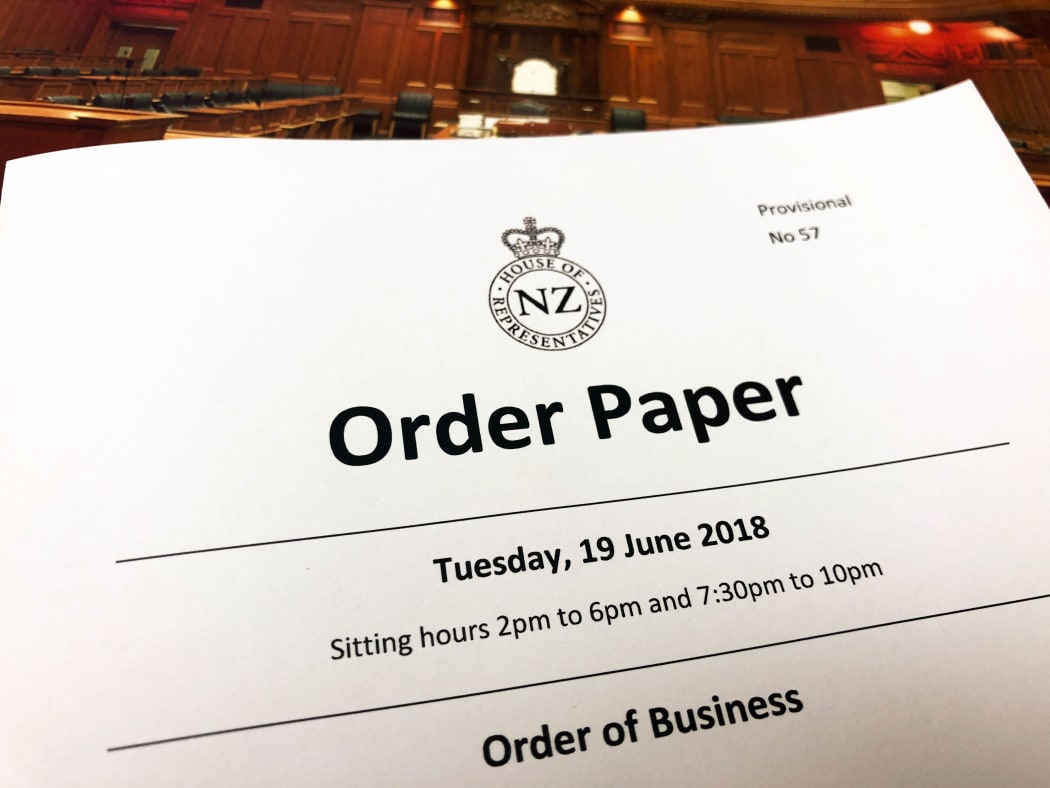The usual question time will happen at 2pm this week but after that MPs will work through a couple of tax bills and approve some interim spending money while Budget 2018 is passed.
The plan for this week (June 19 - 21) is below.

Photo: VNP / Daniela Maoate-Cox
MPs are required to be at Parliament for scheduled sitting days, so called because MPs sit in those green leather chairs when they’re in the debating chamber. An agenda known as the Order Paper is published online each sitting day outlining what business the House plans to get through. But plans change and time is limited so below is what they’ll try their best to get through.
Regional fuel tax (Tuesday/Wednesday)
What:
-
A bill to introduce a tax to help gather money for regions to fund transport infrastructure programmes that wouldn’t otherwise get any money or are delayed.
-
The official bill title is the Land Transport Management (Regional Fuel Tax) Amendment Bill and will enter the committee stage on Tuesday and set down for third reading on Wednesday.
Making multinationals pay tax (Tuesday/Wednesday)
What:
-
The committee stage continued of the Taxation (Neutralising Base Erosion and Profit Shifting) Bill. The bill is pulled apart and debated part by part. There’s no time limit on this part and the Speaker leaves the chair while the House is in Committee.
-
This may be picked up on Wednesday for its third reading if there’s time.
Why:
-
Tax law is a bit like an arms race. Governments write laws to try and force companies and individuals to pay their share of tax, while they, in turn, look for loopholes to exploit so as to minimise their tax.
-
This bill focuses on BEPS tax avoidance schemes whereby multinationals move profits from high tax countries (NZ) to low tax countries (tax havens); so they can report a loss in NZ and a massive profit somewhere else where tax rates are negligible.
Tidy up internal affairs (Tuesday/Thursday)
What:
-
The first reading of the Local Government Regulatory Systems Amendment Bill which may be finished off on Thursday if there’s time.
-
It’s an omnibus bill meaning it will make changes to more than one Act including replacing the definition of disability assist dog in the Dog Control Act 1996 and update the definition of income in the Rates Rebate Act 1973 to reflect changes arising from the Veterans’ Support Act 2014
Why:
-
The Bill responds to the New Zealand Productivity Commission’s July 2014 report Regulatory institutions and practices. The Commission found that finding time in Parliament’s calendar to update legislation can be difficult and regulatory agencies often have to deal with out of date legislation. The Bill is an opportunity for minor and technical amendments to be implemented across the local government legislative regime.
Updating Military Justice (Tuesday/Thursday)
What:
-
The second reading of the Military Justice Legislation Amendment Bill which may be continued on Thursday.
-
It will enhance victims’ rights by updating the military justice system and aligning it with the criminal justice system.
-
It’s an omnibus bill which means it amends more than one Act: the Armed Forces Discipline Act 1971, the Court Martial Act 2007, and the Court Martial Appeals Act 1953.
General Debate (every Wednesday)
What:
-
Twelve speeches of up to five minutes in length after question time on Wednesdays in the House. Speeches are divvied up proportionally so bigger parties get more speeches. Because Ministers aren’t counted in the proportional divvy-up, the opposition side of the House gets more speeches than the government side.
Why:
-
The general debate is a chance for MPs to bring up issues that would otherwise not come up before the House, making it a wide-ranging debate. Sometimes parties take a coordinated approach and speak on the same issue but there’s no rule that they have to.
Pocket money (Wednesday)
What:
-
The second reading of the Appropriations (2017/18 Supplementary Estimates) Bill followed by the third reading with no debate
-
All stages of the Imprest Supply (First for 2018/19) Bill with a debate for its second reading which will be done the same time as the Appropriations Bill.
Why:
-
The Appropriations (2017/18 Supplementary Estimates) Bill signs off on spending over the last financial year that wasn’t quite accounted for in Budget 2017.
-
Budget 2018 aka the Appropriations (2018/19 Estimates) Bill will take a little while to be passed so in the meantime the Government asks Parliament to pass an Imprest Supply measure to give it some interim walking-around-money while the House considers the Appropriations (budget).
Heretaunga Tamatea claims settlement
What:
-
The third reading of the Heretaunga Tamatea Claims Settlement Bill
-
This bill relates to a deed of settlement signed by the Crown with Heretaunga Tamatea that records the Crown's apology and agrees to a final settlement of all historical Treaty of Waitangi claims of Heretaunga Tamatea.
Why:
-
Settlement bills aim to resolve historical claims by Māori against the crown for breaches of the Treaty of Waitangi before 1992.
-
The Treaty, which was signed in 1840, gave sovereignty to the British Crown, allowed Māori to keep rangatiratanga (chieftainship) over their resources while giving the Crown first dibs on any land up for sale, and granted Māori the same rights as British citizens.
-
Settlements include some redress to set things right which can be cultural, commercial, or financial. Once a settlement is reached it becomes law.



